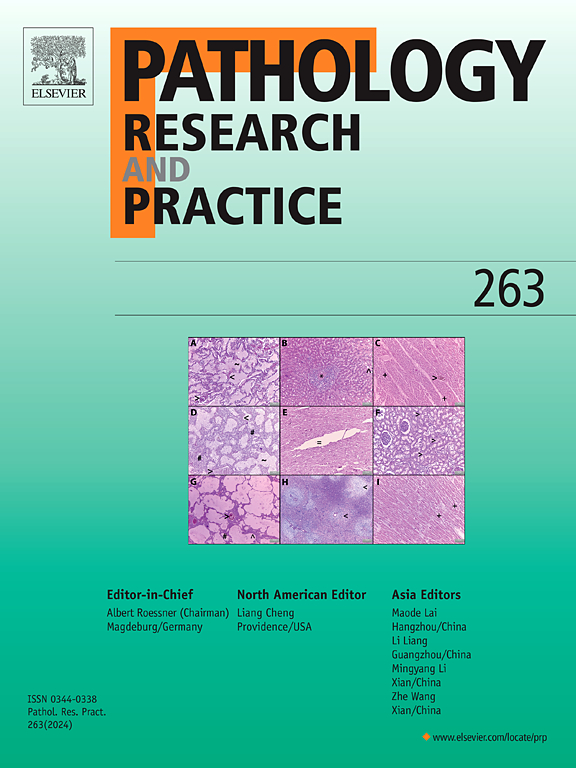黄酮类诱导的口腔鳞状细胞癌治疗的机制信号通路:临床证据和治疗应用
IF 3.2
4区 医学
Q2 PATHOLOGY
引用次数: 0
摘要
黄酮类化合物是一类植物衍生的多酚类化学物质,由于其抗癌特性,正被探索作为口腔鳞状细胞癌(OSCC)治疗的潜在候选者。本文综述了黄酮类化合物的潜在治疗应用及其对OSCC的影响,评估了临床证据,探讨了黄酮类化合物诱导的治疗机制。本文对近年来的实验和临床研究进行了深入分析,以了解黄酮类化合物在OSCC中的作用机制。该综述还通过临床试验和病例研究评估了黄酮类药物治疗血管生成、侵袭、细胞凋亡和细胞增殖的有效性和安全性。黄酮类化合物通过调节PI3K/Akt、MAPK和NF-κB等重要细胞生长和存活信号通路,在OSCC中发挥抗癌作用。此外,研究表明,靶向基质金属蛋白酶等因子可以通过内源性和外源性途径阻止癌细胞的侵袭和转移,诱导细胞凋亡。黄酮类化合物由于其不同的作用模式、安全性和影响关键癌症途径的能力,是治疗OSCC的有希望的疗法。它们可以减少副作用,改善病人的治疗效果。然而,临床试验显示了不同的结果,需要进一步研究以加强患者选择,剂量和配方。需要进一步的机理研究和临床试验来提高其治疗效果。本文章由计算机程序翻译,如有差异,请以英文原文为准。
Mechanistic signaling pathways of flavonoid-induced oral squamous cell carcinoma therapy: Clinical evidence and therapeutic application
Flavonoids, a class of plant-derived polyphenolic chemicals, are being explored as potential candidates for oral squamous cell carcinoma (OSCC) therapy due to their anti-cancer properties. The review explores flavonoids' potential therapeutic applications and their impact on OSCC, evaluating clinical evidence and investigating flavonoid-induced therapy mechanisms. Recent research focusing on experimental and clinical investigations has been thoroughly analyzed to understand the flavonoid mechanisms of action in OSCC. The review also evaluated the efficacy and safety of flavonoid therapy in treating angiogenesis, invasion, apoptosis, and cell proliferation through clinical trials and case studies. Flavonoids exhibit anti-cancer actions in OSCC by modulating essential cell growth and survival signaling pathways like PI3K/Akt, MAPK, and NF-κB. Furthermore, the study suggests that targeting matrix metalloproteinases and other factors can prevent cancer cell invasion and metastasis and induce apoptosis through intrinsic and extrinsic pathways. Flavonoids are promising therapies for treating OSCC due to their diverse modes of action, safety profile, and ability to impact critical cancer pathways. They can reduce side effects and improve patient outcomes. However, clinical trials reveal varied outcomes, necessitating further research to enhance patient selection, dosage, and formulation. Further mechanistic studies and clinical trials are needed to enhance their therapeutic efficacy.
求助全文
通过发布文献求助,成功后即可免费获取论文全文。
去求助
来源期刊
CiteScore
5.00
自引率
3.60%
发文量
405
审稿时长
24 days
期刊介绍:
Pathology, Research and Practice provides accessible coverage of the most recent developments across the entire field of pathology: Reviews focus on recent progress in pathology, while Comments look at interesting current problems and at hypotheses for future developments in pathology. Original Papers present novel findings on all aspects of general, anatomic and molecular pathology. Rapid Communications inform readers on preliminary findings that may be relevant for further studies and need to be communicated quickly. Teaching Cases look at new aspects or special diagnostic problems of diseases and at case reports relevant for the pathologist''s practice.

 求助内容:
求助内容: 应助结果提醒方式:
应助结果提醒方式:


